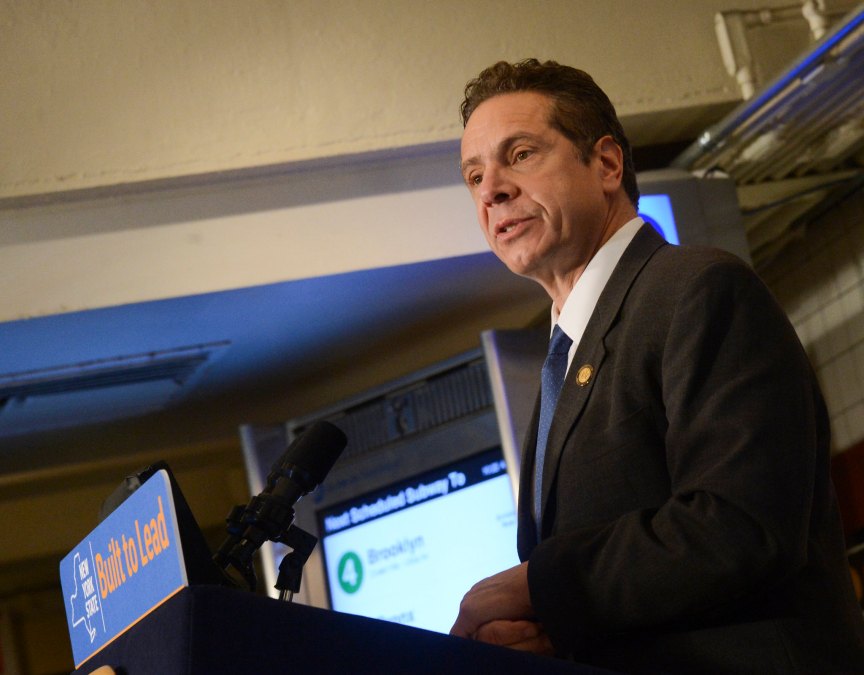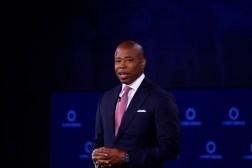N.Y. Gov. Cuomo vetoes municipal broadband bill, favoring state initiative

New York State won’t be helping municipalities considering building their own broadband networks, as Democratic Gov. Andrew Cuomo has vetoed a bill that would have studied the issue and provided guidance.
The bill, sponsored by Assemblywoman Aileen Gunther, a Democrat, would have directed the New York Department of Public Service to explore the costs, resources and outside expertise necessary for municipalities in New York to create their own broadband networks. New York doesn’t have laws that specifically outlaw or impede the creation of municipal broadband projects, as some states do, but the state also has no explicit program to promote them.
In a veto message last month, Cuomo said that funding the study would have been expensive and that it was unlikely to have been completed within the given 12-month time frame.
“Each community is unique and the costs of administering a broadband program would vary based on myriad factors such as the local tax base, environmental impacts, and community character,” he wrote. “In order to deliver the study called for in the bill, funding must be allocated. Therefore, this bill would be more appropriately addressed during state budget negotiations.”
Cuomo has repeatedly voiced support for universal access to broadband, chiefly through creation a $500 million state-run program that pledges to secure internet access for all residents.
Gunther’s bill would have directed one year of study on the feasibility of internet service providers operated by local governments and delivered a report to the governor and state legislature.
“Access to high-speed internet is no longer a luxury; it is a necessity,” Gunther wrote in a memo accompanying the bill. “There are areas of our state where it is simply unprofitable for private ISPs to expand their networks. Instead of giving taxpayer dollars to corporations that only seek to profit off our state’s residents, we should be putting that money back into our communities.”
Some studies have shown municipal broadband networks to be faster and at least as affordable as services provided by privately run companies, with six of the top 10 fastest ISPs in the country being at least partially municipally run.
As of last April, there were about 500 municipal networks nationwide and 300 communities with internet provided through a cooperative, according to BroadbandNow.com, though the regulatory environment has never been tougher for towns interested in managing their own service. At least 25 states have taken legislative or executive action to impede the construction and operation of publicly owned internet infrastructure. This is led by heavy lobbying efforts from large ISPs such as Verizon and Charter. North Carolina, for example, imposes strict legal and financial requirements on public internet utilities.
New York is not one of the states that has enacted legal roadblocks against municipal internet, but Cuomo and several opposing lawmakers said the bill would be a waste of money in the face of New York’s other broadband expansion efforts. The state is the fourth-most connected in the country according to Broadbandnow.com, and in 2015, Cuomo launched the state’s Broadband for All program, with the goal of spending $500 million in state money over three years to reach 100 percent broadband connectivity. Cuomo’s office dispersed the final $341 million to private providers so that they could expand service into rural unserved areas in January 2018, but it could take additional time to connect an estimated 8.7 million people in rural Upstate New York who aren’t using broadband internet, according to a Microsoft study released last year.
As a result, some lawmakers say it’s unclear whether Cuomo’s program can be deemed successful. The governor’s office claims that 99.9 percent of New Yorkers will have access to high-speed internet after the receiving providers have completed installations.
Assemblyman Andrew Goodell, a Republican and one of 26 opposing votes on Gunther’s bill in the Assembly, said he wants to wait to study the viability of publicly run internet in New York.
“Before we go down the path of creating a government-operated system to compete with the private sector, supported by taxpayers across the state, I think it would be better for us to evaluate the nature and extent of the governor’s initiative, why it was successful or not successful, and look to tweak that program so that we don’t create more ways to spend taxpayer money in competition with the private sector,” Goodell said.






